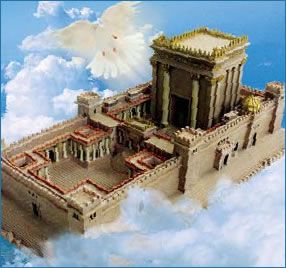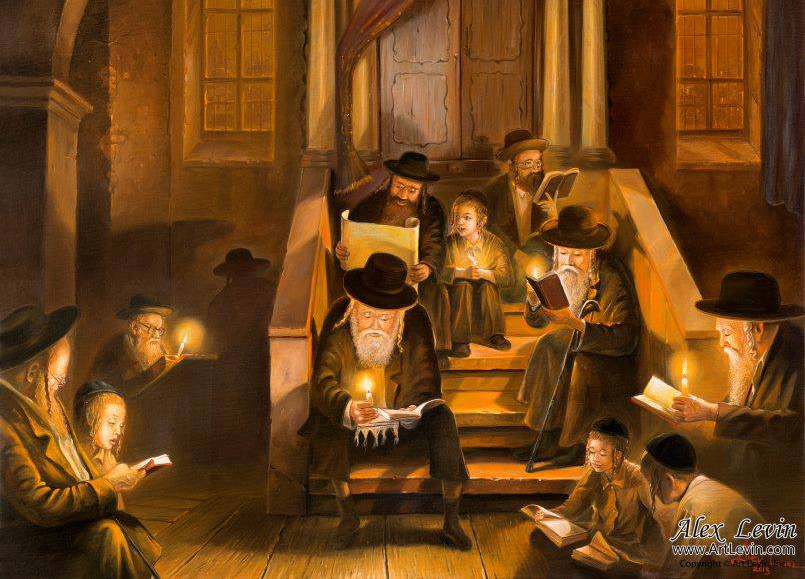Yesterday was the 9th day of the month of Av or, in Hebrew, Tisha B’Av. Usually, Tisha B’Av is marked by mourning and fasting. Yesterday, however, we ate festive meals, drank wine and were prohibited from fasting or displaying any signs of mourning. Because yesterday was Shabbat. Shabbat pushes off the observances of Tisha B’Av by a day. Indeed, today, Sunday, we fast and mourn the destruction of the First and the Second Holy Temple – Bet Hamikdash – in Jerusalem, we remember the Holocaust and many other tragedies that befell the Jewish people.
Why couldn’t we observe Tisha B’Av on Shabbat? After all, that was the day when on the 9th of Av, both Temples were destroyed! The simple explanation, of course, is that on Shabbat there is no mourning. On Shabbat, one must rejoice, eat, drink, and be happy. I think, however, there is a deeper reason why we don’t mourn the destruction of the Temple on Shabbat, and it has to do with relativity.
In 1905, Albert Einstein published his famous paper, “On Electrodynamics of moving bodies,” where he formulated his Special Theory of Relativity. Einstein demonstrated that inertial motion is relative, and our perception of time is also relative, depending on the frame of reference – the faster you move, the slower your time gets relative to the resting observer. In 1907, the Jewish mathematician Hermann Minkowski, who was Einstein’s professor of mathematics at Göttingen, showed that Einstein’s Special Theory of Relativity erases the separation between space and time.  Instead of a three-dimensional space and one-dimensional time, we actually live in four-dimensional spacetime, or the World (the Velt in German, as Minkowski called it). Space and time are inextricably mixed in this four-dimensional World. What we call “space” is only a space-like three-dimensional hypersurface in the four-dimensional World; and what we call “time” is only a time-like one-dimensional line in the four-dimensional World. Sometimes, the four-dimensional World can be decomposed into the sum of a space-like three-dimensional hypersurface and one-dimensional time; but other times it is not possible as space and time remain inseparably mixed together.
Instead of a three-dimensional space and one-dimensional time, we actually live in four-dimensional spacetime, or the World (the Velt in German, as Minkowski called it). Space and time are inextricably mixed in this four-dimensional World. What we call “space” is only a space-like three-dimensional hypersurface in the four-dimensional World; and what we call “time” is only a time-like one-dimensional line in the four-dimensional World. Sometimes, the four-dimensional World can be decomposed into the sum of a space-like three-dimensional hypersurface and one-dimensional time; but other times it is not possible as space and time remain inseparably mixed together.
Interestingly, Kabbala also talks about a four-dimensional spacetime. Actually, the oldest book of Kabbala, Sefer Yetzirah, speaks of a five-dimensional word made of three spatial dimensions, time dimension, and the fifth, moral dimension (see, for example, On the Nature of Time and the Age of the Universe). Setting the moral dimension aside, we are left with a four-dimensional spacetime, not unlike the Minkowski World.
The connection between Shabbat and Bet HaMikdash (the Holy Temple) is not difficult to find. Contrary to a popular misconception that one is not allowed to work on Shabbat, because one needs to rest, it is not exactly so. It’s not about hard work. If you wish to schlepp heavy furniture from one room in your house to another, sweating profusely, you’d be violating no laws prohibiting “work” on Shabbat. What is prohibited are 39 specific activities that were involved in building a Sanctuary – Mishkan (see, Mishkan – a Metaphor for Quantum Reality and Mishkan – a Metaphor for Quantum Reality, II), as they are listed in the Torah. We immediately see the connection between Shabbat and Bet HaMikdash from the laws of Shabbat – we learn what is not allowed on Shabbat by studying what was done to build the Sanctuary.
There is more than that. Our sages teach that Shabbat is a Temple in Time. Just as Bet HaMikdash was a sanctuary in space, Shabbat is a sanctuary in time.
Perhaps, we can say that G‑d built Himself a four-dimensional sanctuary in the four-dimensional spacetime. When we look at the space-like three-dimensional hypersurface of this four-dimensional World, we see the Bet HaMikdash. When we look at the one-dimensional time-like slice of this World, we see Shabbat.
This may help us understand why we don’t mourn the destruction of Bet HaMikdash on Shabbat when we are in a time-like Sanctuary! You can’t cry about the destruction of the Bet HaMikdash when you are in it! Comes the next day, Sunday, when we move out of the Sanctuary of Shabbat, and now we can focus on the loss of the Sanctuary in space.
Let us remember that, as Minkowski proved a century ago, space and time are inseparable in the four-dimensional World. So too, the Sanctuary in space – Bet HaMikdash – is intimately connected with the Sanctuary in time – Shabbat, relativistically speaking. When we observe Shabbat properly, we help rebuild the Bet HaMikdash. This is why the sages of the Talmud said, if the whole of Israel were to keep two Shabbats in a row, the Bet HaMikdash would be restored immediately. May it happen speedily in our days!

